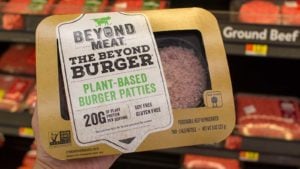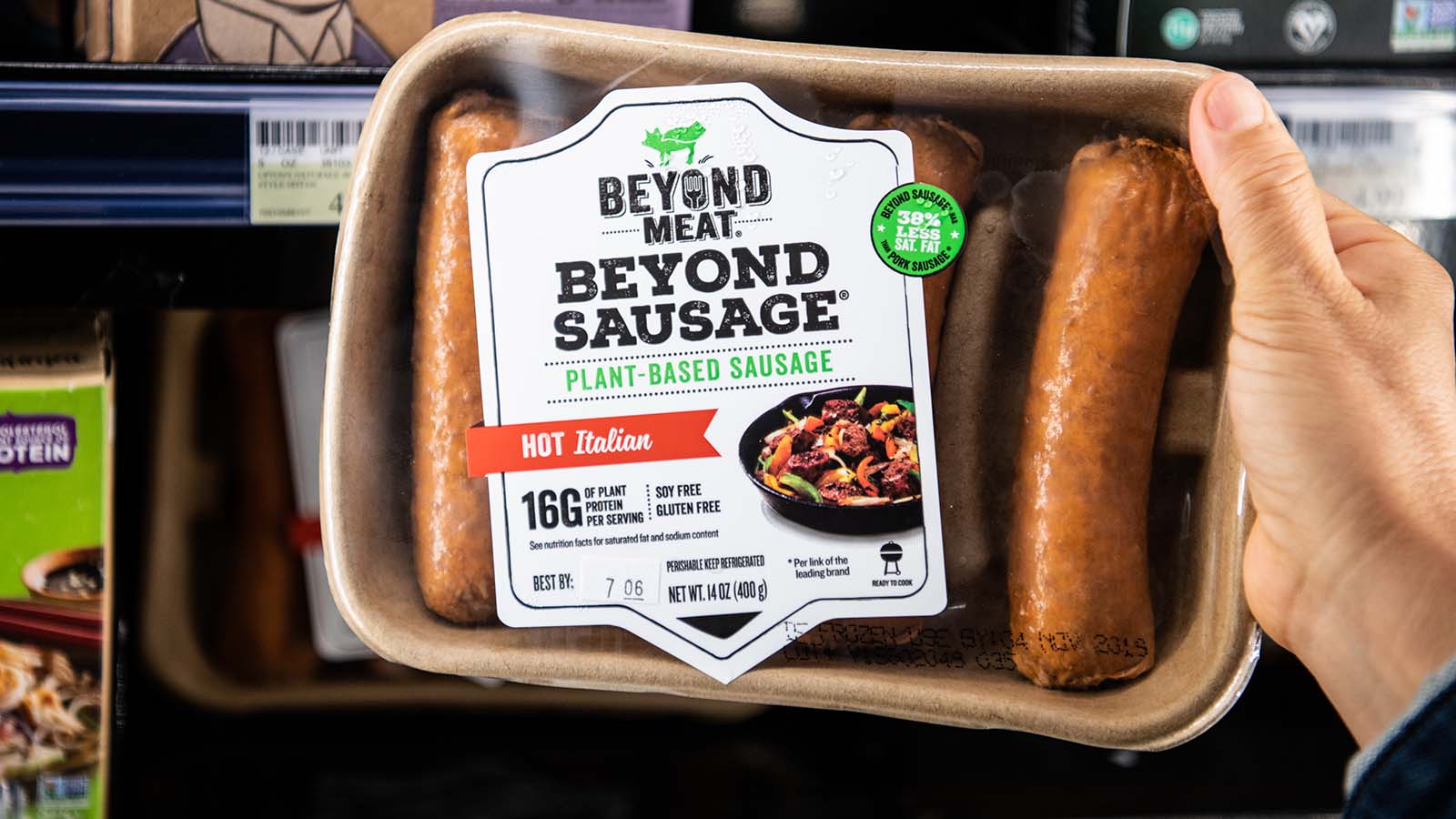Beyond Meat (NASDAQ:BYND) is rolling again, despite being one of 2019’s biggest bubbles. Beyond Meat stock climbed from an initial public offering price of $25 on May 1 to almost $240 by the end of July. By year-end, the company had fallen over two-thirds from its peak.

Of course, even after the decline, those investors fortunate enough to get in at the IPO price had tripled their money. Shares rose 163% on the first day, and another 15% over the rest of the year. And Beyond Meat stock has turned up again in 2020: its 46% rally makes it the eleventh-best mid-cap performer so far in 2020, of over 1,100 such stocks.
Certainly, the optimism makes some sense. The market for plant-based meat will be large. Beyond Meat turned a profit in the third quarter. Wall Street expects increased earnings in 2020 and for years to come. Investors, meanwhile, have proven in recent years that they will pay dearly for fast-growing and profitable revenue.
But there are reasons for caution as well. Two key risks, in fact, present potential stumbling blocks to Beyond Meat stock in 2020. And while I don’t necessarily expect another bubble to pop, I do expect that the company will at least see a correction or two as the year rolls on.
Plant-Based Meat Takes a Leap
The plant-based meat industry unquestionably took a huge step forward in 2019. Restaurant Brands International’s (NYSE:QSR) Burger King launched the Impossible Whopper, from Beyond Meat rival Impossible Foods. Impossible products are available at White Castle, Qdoba and even in Disney (NYSE:DIS) theme parks.
Beyond Meat has expanded its distribution as well, to the likes of Denny’s (NASDAQ:DENN), Carl’s Jr., Subway and TGI Friday’s. Meanwhile, retail sales have skyrocketed as well. Through the first nine months of 2019, Beyond Meat generated over $100 million in retail sales. The figure increased nearly 200% year-over-year.
Sales are skyrocketing. Distribution continues to expand. McDonald’s (NYSE:MCD) still looms as the “Holy Grail,” assuming a trial of the “P.L.T” in Canada goes well. Surely, given recent growth, fake meat doesn’t seem like it could be a fad.
Is ‘Fake Meat’ a Fad?
But I’ve tried plant-based burgers myself. I didn’t hate them … but I’d hardly eat one every week. And I can’t help but wonder how many consumers feel the same way. Sales for Beyond Meat and other plant-based burgers are getting a big bump right now from curious consumers. It remains clear how many of those first-time buyers will become regular consumers — or even just second-time buyers.
And the industry needs big sales beyond the vegan market. That market simply isn’t large enough, and it already has an established provider in Kellogg (NYSE:K) unit MorningStar Farms. I’m one of the many customers who like plant-based meat. But how many of us like it enough?
Meanwhile, plant-based meat is not healthy: whether it’s the Beyond Burger or the Impossible Whopper, “they are super, highly processed foods,” as Whole Foods CEO John Mackey put it. Real meat has health concerns too. But if there’s a trade-off with taste for little, or no, nutritional improvement, plant-based meat remains a curiosity at best. Beyond Meat stock is not priced for its product to remain a curiosity.
Again, I’d expect that sales and revenue will still grow going forward. But Beyond Meat has a market capitalization over $7 billion. Impossible Foods reportedly is looking to raise capital at a $5 billion valuation and could itself go public in the next year or two. These are big numbers that require a big market. If any restaurant partners fall away — as Tim Hortons did just last week — investors may wonder if that market really is big enough. The stock simply isn’t priced for that risk.
The Competitive Risk to Beyond Meat Stock
And even if the market for fake meat is as large as hoped, Beyond Meat’s competition is going to stiffen in 2020. Beyond Meat and Impossible Foods get most of the headlines, but giants are targeting plant-based meat as well.
Nestle (OTCMKTS:NSRGY) is making a big push. Tyson Foods (NYSE:TSN), which invested in Beyond Meat before its IPO, is developing its own fake meat. Sysco (NYSE:SYY) has developed a plant-based burger patty for its foodservice customer, including colleges. There’s no doubt that they’re an attractive market.
Beyond Meat has the first-mover advantage. But that doesn’t guarantee success. As regular readers know, I’m always looking for major trends that can deliver huge returns. Plant-based meat might be one of those trends. Even if it is, the returns also might be spread out among several, if not dozens, of companies.
Beyond Meat isn’t Shopify (NYSE:SHOP) or even Tesla (NASDAQ:TSLA) in that it’s years ahead of competitors. Those competitors are on its heels. And they’re catching up.
A History Lesson
Last decade, one of the big trends in U.S. food was “gluten-free.” That industry’s leader was Boulder Brands, whose portfolio included Udi’s, Glutino, and Earth Balance plant-based butters.
Gluten-free became a buzzword. And Boulder stock soared. Beginning in 2012, it more than tripled in less than to years, reaching a price above $16. Within a year, the stock lost 40% of its value. The company sold itself to Pinnacle Foods for $11.
National Beverage (NASDAQ:FIZZ) almost single handedly created the sparkling water market with LaCroix. Its growth has stalled out amid increased competition, and its stock has dropped over 60%.
Obviously, there are differences between Beyond Meat, LaCroix and Boulder Brands. But there may well be similarities as well. Consumer tastes change. Trends aren’t always as sustainable as they appear. “Hot” markets attract new, larger competitors with deep pockets.
This doesn’t mean Beyond Meat is a bubble. It doesn’t make the stock a short. But history does suggest at least some caution. After the big 2020 rally, Beyond Meat stock looks priced for perfection.
Matthew McCall left Wall Street to actually help investors — by getting them into the world’s biggest, most revolutionary trends BEFORE anyone else. The power of being “first” gave Matt’s readers the chance to bank +2,438% in Stamps.com (STMP), +1,523% in Ulta Beauty (ULTA) and +1,044% in Tesla (TSLA), just to name a few. Click here to see what Matt has up his sleeve now. Matt does not directly own the aforementioned securities.
